
Connecting Texas books and writers with those who most want to discover them

TRAVELING?
TOP TEXAS
BOOKISH DESTINATIONS
Search our archives:

At the Writing Barn (Austin), host Bethany Hegedus introduces author Mary Helen Specht (Migratory Animals) and invites visitors to tour the grounds and the new Book House on January's last Wine & Words Wednesday. Photos by Barbara Brannon
AUSTIN Thurs., Feb. 12, Avaya Auditorium, Michener Center for Writers Reading Series presents Matthea Harvey, 7:30PM
DALLAS Thurs., Feb. 12: SMU DeGolyer Library, Book signing and lecture with Ezra Greenspan: William Wells Brown: An African American Life, 6PM
SNYDER Sat., Feb. 14: College on the Square: Fiction coauthors Kay Ellington and Barbara Brannon read and sign The Paragraph Ranch during ChocolateFest, 5–8 pm
Bookish Texas event highlights 2.8.2015 >>more
Michelle Newby, Contributing Editor
 Latest Harmony novel goes
Latest Harmony novel goes
back to the town’s beginning
Amarillo author Jodi Thomas is winding down her Harmony series, but is working on a new romance series about Texas ranch life.
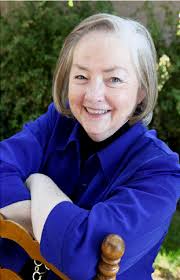 Her latest Harmony novel is A Place Called Harmony (Berkley, $7.99 paperback), which serves as a prequel to the rest of the series. All the stories take place in the small, fictional Texas Panhandle town of Harmony.
Her latest Harmony novel is A Place Called Harmony (Berkley, $7.99 paperback), which serves as a prequel to the rest of the series. All the stories take place in the small, fictional Texas Panhandle town of Harmony.
Another Harmony book, One True Heart, is due out in April. Thomas said she thinks it is “the funniest book I’ve ever written.”
And there will be one more Harmony novel, a Christmas book, possibly next year.
Now she’s moving on to the Ransom Canyon series, with the first story scheduled to come out in late August.
Back to A Place Called Harmony, the eighth book in the series. This one is set in the mid-1870s, when trading post owner Harmon Ely decides one day to expand his post and create a town. He puts out the word that married couples who come to help him build the town will be rewarded with 40 acres and a house to live in.
He stipulates that they must be married, however. And thus begins the tale of three families who figure prominently in the later Harmony novels—the Trumans, the Mathesons, and the McAllens. And a fourth family, the Wrights, wander into town at just the right time.
“For those of you who read the series,” Thomas writes, “you’ll love knowing how it all started. “For those who haven’t visited Harmony yet,” she adds, “you’ll be stepping into a community at the birth of not only a town, but of friendships that will last for lifetimes. If you enjoy this tale, you might just stay awhile and read the rest of my stories.”
History, romance and intrigue intertwine in this fast-paced tale with characters who really come alive as they seek to leave their past difficulties behind and build a better future for their families.
In addition to being a best-selling novelist and A. C. Greene Award winner, Jodi Thomas is writer in residence at West Texas A&M University in Canyon.
* * *
Jack Prine: Texas author Rod Davis’s new novel, South, America (NewSouth Books, $24.95 paperback), begins in New Orleans when journalist and private investigator Jack Prine happens upon the body of a well-dressed black man with a bashed-in skull.
Before long he finds himself mixed up in a complicated and deadly case involving the victim’s beautiful sister, the Dixie Mafia, racists, voodoo, family secrets and priceless stolen art. Davis moves the action along through Alabama, the Delta, and back to New Orleans with crisp dialogue and hair-raising encounters.
* * *
Glenn Dromgoole is co-author of 101 Essential Texas Books. Contact him at g.dromgoole@suddenlink.net.
WHERE IN TEXAS?
BOOKISH TEXAS
Subscribe to our weekly e-newsletter to read Michelle Newby's Texas Bookish Events from around the state.

Lone Star Book Reviews 2.8.2015 >>more
By staff and contributors
 MARY HELEN SPECHT
MARY HELEN SPECHT
Migratory Animals: A Novel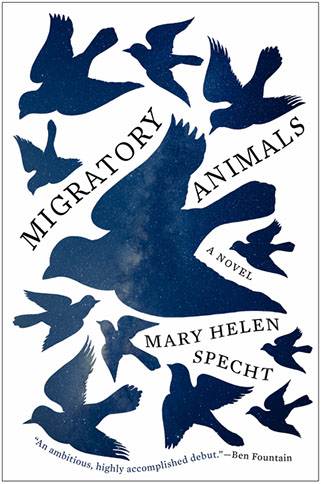 FICTION Harper Perennial, Paperback/Deckle Edge, January 20, 2015, 2015, 978-0062346032, 320 pp., $14.99 (also available in e-book)
FICTION Harper Perennial, Paperback/Deckle Edge, January 20, 2015, 2015, 978-0062346032, 320 pp., $14.99 (also available in e-book)reviewed by Michelle Newby, Contributing Editor
“The Old English and High German word for building, buan, means to dwell. This signifies to remain, to stay in a place…to preserve and care for…”
What does “home” mean to you? Is it a place? A person? A particular period of time when you felt most like who you believed or wanted yourself to be? What happens when the meaning of home changes? How do we balance what we owe those we love and what we owe ourselves? Migratory Animals, Mary Helen Specht’s debut novel, unflinchingly tackles the hard stuff.
Specht employs five points of view to tell the story of a group of best friends from college who have each come to a crossroads. Flannery, prodigal daughter, sister, friend and flame, is “on the lam” in Nigeria from a difficult childhood and needy family. She has been there for five years and has built a career and fallen in love with a local. When Flannery returns to Austin to complete research that will allow her to secure funding so she can implement that research in Nigeria, she finally has to choose between her two lives. Her sister Molly has begun to exhibit symptoms of the genetic disease that killed their mother. Alyce, Flannery’s best friend, is (mostly) idly suicidal in a recurring depression. Flannery’s former flame Santiago is mired in the economic downturn of 2008 and still hoping she’ll come back to him. Harry is Alyce’s husband and Santiago’s business partner, trying to keep his family and business afloat. “All the things one thinks it is impossible to bear and yet. And yet. Who does not have to bear them?”
Migration is a powerful metaphor. So far this group of friends has moved as a flock. But peoples’ needs and circumstances change. Migratory Animals is a poignant examination of group dynamics, the individual’s role in that group, and the necessary adjustments and shifting alliances when an individual’s needs no longer allow him or her to perform the their assigned functions within the group. Every migratory pattern has a few outliers. Duty is a recurring theme, particularly the duty to witness. If a tree falls in a forest . . .
This is not an action novel, not plot-driven but character-driven, and the pacing can be a bit slow. We spend most of our time inside these characters’ heads. Fortunately, Specht has created vivid and complete characters with compelling backstories. My only quibble with them is that they are almost self-consciously multicultural—but as such they mirror Austin quite well.
Not every circumstance will turn out to have a happy resolution, but the ending is satisfying. A couple of threads are left to hang, but then that’s life, isn’t it?
Michelle Newby is contributing editor at Lone Star Literary Life, reviewer for Foreword Reviews, freelance writer, member of the National Book Critics Circle, and blogger at www.TexasBookLover.com. Her reviews appear or are forthcoming in Pleiades Magazine, Rain Taxi, World Literature Today, South85 Journal, The Review Review, Concho River Review, Monkeybicycle, Mosaic Literary Magazine, Atticus Review, and The Collagist.
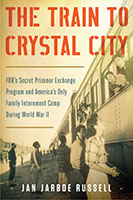 JAN JARBOE RUSSELL
JAN JARBOE RUSSELL
The Train to Crystal City: FDR’s Secret Prisoner
Exchange Program and America’s Only Family
Internment Camp During World War IINONFICTION Scribner, 2015, 978-1-4516-9366-9, 400 pp., $30.00
reviewed by Michelle Newby, Contributing Editor
“Enemies are people whose stories you haven’t yet heard and whose faces you haven’t yet seen.” –Irene Hasenberg Butter
Well. They don’t teach you this stuff in school. From 1942 until 1948 at Crystal City, in the south Texas desert thirty miles from the Mexican border, the federal government operated the only family internment camp in the world during World War II. Approximately 6,000 German, Italian and Japanese civilians—termed “dangerous enemy aliens” and their American-born children—were held indefinitely, without charge or trial. Crystal City also held detainees whom FDR used as leverage in prisoner exchanges with the Axis powers. For the detainees, Crystal City represented reunion with their families, the carrot preceding the stick of repatriation.
Jan Jarboe Russell tells the larger tale of Crystal City by focusing on two teenage girls who lived in the camp behind barbed-wire fences patrolled on horseback, watched by armed guards in towers. Ingrid Eiserloh from Ohio spent eighteen months in Crystal City with her mother and siblings when her father, a German legal resident of the United States, was arrested by the FBI and placed in “custodial detention.” Sumi Utsushigawa from Los Angeles spent more than two years in Crystal City with her parents, both legal Japanese immigrants.
In perhaps the most moving passages, Russell weaves in the story of the prisoner Ingrid was eventually exchanged for: Irene Hasenberg, a German Jew and survivor of Bergen-Belsen concentration camp. This episode conveys one of the abundant brain-boggling ironies in Crystal City: exchanging an American citizen for a German citizen. Paradoxes abound. Ingrid’s father, deported as an enemy of the state, was hired by the U.S. Army in Germany as a translator. Sumi, an American citizen, was deported to Japan with her parents where she, too, found work as a translator with the occupying US Army.
Crystal City is thoroughly researched narrative nonfiction written in a colloquial style that makes history engaging and accessible for all. It is rich in the seemingly small details that evoke an era, place, and experience. For example, the Japanese detainees complained they had nothing with which to grind tofu. This problem was resolved with pestles and molinos from a local Mexican restaurant. One of my favorite anecdotes involves a group of Japanese boys who repeatedly serenaded the guards in the towers with “…many choruses of one of the top tunes of the hit parade, 'Don’t Fence Me In.'” Jarboe Russell doesn’t preach at us; she presents the facts, leavened by the personalities of the individuals involved, and lets the work speak for itself. This is an important addition to not only Texas history, but world history.
I’ll end this review with a quote from a letter written by a Crystal City detainee to the INS. “No living thing should be locked up…When I am free, I want to live in a house without locks, even without doors. It will be a house made up of windows and the view must not be obstructed by anything, not even mountains.”
* * *
Michelle is contributing cditor at Lone Star Literary Life, reviewer for Foreword Reviews, freelance writer, member of the National Book Critics Circle, and blogger at www.TexasBookLover.com. Her reviews appear or are forthcoming in Pleiades Magazine, Rain Taxi, World Literature Today, South85 Journal, The Review Review, Concho River Review, Monkeybicycle, Mosaic Literary Magazine, Atticus Review, and The Collagist.
 FORTHCOMING REVIEWS
FORTHCOMING REVIEWS
from Michelle Newby, NBCC, Contributing EditorWeek of February 15
The Same Sky, Ballantine
From Austinite Amanda Eyre Ward, author of five novels, including How to be Lost and Close Your Eyes, comes a ripped-from-the-headlines story of undocumented immigration in Texas. She has spent the last year visiting shelters in Texas and California, meeting immigrant children and hearing their stories; her new novel is inspired by what she learned.
Texas Reads 2.8.2015 >>more
Glenn Dromgoole
Lone Star Listens 2.12.2015
Thomas H. McNeely on Ghost Horse, Texas authors, and barbecue
by Kay Ellington
Thomas H. McNeely, author of Ghost Horse, winner of the Gival Press Novel Award, reads and signs at numerous Texas venues during spring 2015
From the Dallas Morning News: "Henry Chappell’s recent third novel, Silent We Stood, paints an engrossing, fact-based and frequently tense portrait of slavery and anti-slavery sentiments in North Texas in 1860."
Henry Chappell reads and signs Silent We Stood, Thurs., Feb. 12, Fort Worth Public Library Central Branch, 6:30 PM
McNEELY: “During the time I was teaching at Stanford, my father took his own life, an event that nearly ended my work on Ghost Horse. That loss is buried deep inside this book. I’ve also been writing short stories and pieces of a memoir, a section of which will be published in Texas Monthly this spring.” >>more
LSLL corresponded with Texas native Thomas H. McNeely, now living and teaching at Emerson College, by email on a day when Boston was nearly immobilized by snow and Lubbock had an eighty-degree January afternoon. We didn’t envy him.
LSLL: First, kudos on Ghost Horse, and a lifetime of impressive literary and professional experiences. How do you think the time frame define each of these experiences for you?
Thank you, Kay, for having me on Lone Star Literary Life. I am honored by this invitation, and grateful that you are providing this service to the Texas literary community.
I grew up in Houston, which is where Ghost Horse, my debut novel, is set. I have been a Dobie Paisano fellow, a Wallace Stegner fellow at Stanford, a defense investigator of capital murder cases, and a staffer at the Daily Texan.
When I was growing up in Houston, I wanted to be a writer. This came to me, I think, from my grandmother, Alice Cochran, who won the Intercollegiate Cup for Elocution in 1918. She could recite poetry well into her eighties and continues to be an inspiration to me. Writing on deadline for the Texan was my first exposure to what it would mean to be a professional writer—I was very lucky to work with some amazingly talented writers and editors, and also to have wonderful writing teachers at UT—James Magnuson, Elizabeth Harris, and Thomas Whitbread. The lessons I learned in those classes are ones I still call upon in my writing and teaching. >>more
 ROMANCE IN THE AIR 2.12.2015
ROMANCE IN THE AIR 2.12.2015
by Beth Stifflemire
Did you know that on Amazon’s recently released a list of cities that buy the most romance books, the city of Round Rock, Texas placed #9? Just goes to show that Texans love their romance reads. And in this season of valentines, chocolates, and love, if you’re a romance reader there are plenty of juicy options on the horizon to stock your bookshelf plentifully, from Harlequin romance to hot new releases in popular series. >>more
Check out this week's Romance Roundup of Texas romance books and authors!
 BOOKISH TEXAS
BOOKISH TEXAS
events 2.8.2015
by Michelle Newby, NBCC >>more
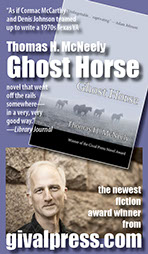


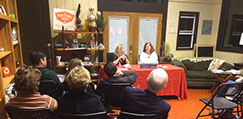
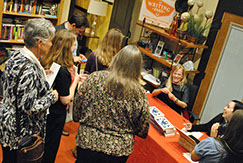



![]()
![]() LONE STAR LITERARY LIFE copyright © 2015–18 Paragraph Ranch LLC • All rights reserved • CONTACT US
LONE STAR LITERARY LIFE copyright © 2015–18 Paragraph Ranch LLC • All rights reserved • CONTACT US
